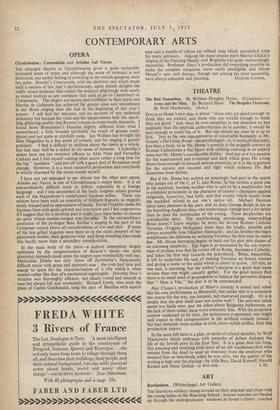CONTEMPORARY ARTS
OPERA
Glyndebourne : Cenerentola and Ariadne Ad Naxos.
THE enlarged theatre at Glyndebourne gives a quite noticeably increased sense of space and although the sense of intimacy is not destroyed, any earlier feeling of crowding in the outside gangway seats has gone. Rossini's Cenerentola, with the identical cast which made such a success of last year's performances, again plainly delights the oddly mixed audience that makes the arduous pilgrimage with surely as mixed motives as any company that used to go to Canterbury or Compostela. The singers arc secure and confident in their parts and Marina de Gabarain has achieved far greater ease and smoothness in her florid singing than she had at the beginning of last year's season. I still find her mis-cast, not on account of any technical deficiency but because her voice and her temperament lack the spark- ling, glittering quality that Rossini's music so imperiously demands. I found Sesto Bruscantini's Dandini slightly different from what I remembered, a little broader (probably the result of greater confi- dence) and not quite so carefully sung. Ian Wallace hag brought his Don Magnifico to a fine point of comedy and his singing is greatly polished. I find it difficult to enthuse about the opera as a whole, but that may well be a defect in my sense of humour. Cinderella's sisters bore me (no remotest offence to Alda Noni and' FernAda Cadoni) and I find myself waiting what seems rather a long time for the big " numbers " and put off with a good deal of Rossinian small change. However, it is a most successful production and everybody is wholly charmed by the music except myself.
I have not yet managed to see Alceste but the other new opera, Ariadne auf Naxos, is one of Glyndebourne's major feats. It is an extraordinarily difficult work to follow, especially in a foreign language ; and I was astonished at the lively laughter which greeted each of the Majordomo's complicated German sallies. There can seldom have been such an assembly of brilliant linguists so magnifi- cently dressed and so appreciative of music. David Franklin spoke his German lines with great aplomb and conviction and I feel ungenerous if I suggest that for a speaking part it might have been better to choose an actor whose mother-tongue was German. In the extraordinary confusion of the prologue Sena Jurinac's singing in the part of the Composer soared above all considerations of text and plot. If some of the less gifted linguists were hazy as to the exact purport of her passionate tirades, their generous tone and long sweeping lines made this hardly more than a secondary consideration.
In the main body of the piece—a tedious conception largely redeemed by the sumptuousness of Strauss's music—the quite abnormal demands made upon the singers were wonderfully well met. Mattiwilda Dobbs not only threw off Zerbinetta's fantastically difficult music with grace and apparent ease ; she even had time and energy to spare for the characterisation of a role which is often treated rather like that of a mechanical nightingale. Dorothy Dow's Ariadne was thoroughly efficient, not ideally round and smooth in tone but always full and musicianly. Richard Lewis, who took the place of Carlos Guichandut, sang the part of Bacchus with superb ease and a wealth of robust yet refined tone which astonished even his many admirers. Among the many smaller parts Murray Dickie's singing of the Dancing Master and Brighella was quite outstandingly successful. Professor Ebert 's'production did everything possible to make the complex situations more easily intelligible and Oliver Messel's sets and dresses, though not among his most successful, were always adequate and pleasing. MARTIN COOPER.


























































 Previous page
Previous page